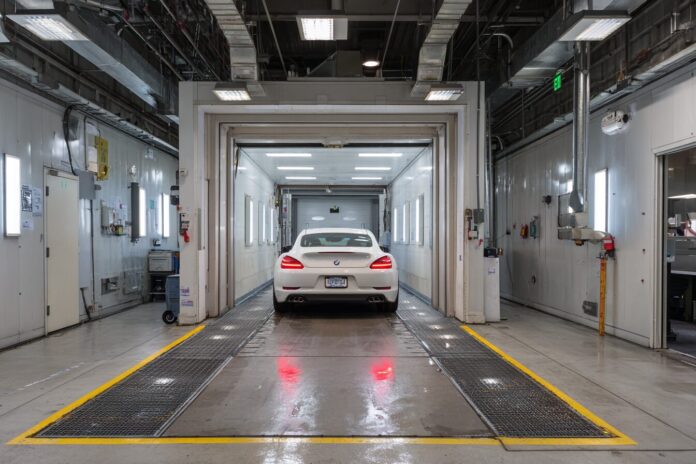AI Brings Speed and Precision to Rental Car Returns
Stepping off a flight and returning a rental car used to be a personal interaction that allowed for discreet negotiations and human judgment, but the landscape is quickly evolving. Most importantly, the industry is integrating AI-powered vehicle inspection systems to streamline the process.
Because these systems produce rapid, high-resolution scans, they ensure that every scrape and dent is captured with precision. For instance, technologies developed by industry leaders are now implemented at major companies, such as those highlighted by Parade. This advancement not only speeds up the return process but also leaves little room for personal interaction and dispute resolution, which was once a hallmark of traditional inspections.
Automated Damage Detection: How Does It Work?
Rental giants like Hertz and Avis have introduced high-resolution AI scanners at major rental hubs. In these automated settings, you may find yourself driving through a tunnel equipped with sophisticated cameras and lighting systems. The AI software meticulously compares current images with those taken at pickup, identifying even the smallest discrepancies.
Most importantly, the process is designed for efficiency. As noted by Fullestop, the technology not only minimizes the chance of human error but accelerates damage detection to levels previously unimaginable. Therefore, even minor scratches or dings are flagged, emphasizing the system’s strict adherence to maintenance standards.
Faster—and Less Forgiving
Because AI detects issues with unmatched precision, billing can occur almost instantaneously – sometimes even before you have left the airport. This means that any flagged imperfections, no matter how subtle, may lead to automated charges on your card. In several incidents, as discussed in detailed reports by Carscoops, these charges came with additional administrative fees that further burden the renter.
Besides that, this automated process eliminates the possibility of a friendly conversation or negotiation about potential damage. Most importantly, because the inspection is based solely on visual data, there is little room for context or explanation. A renter might face a quick charge application without the opportunity to provide evidence of pre-existing conditions, which complicates the dispute process significantly.
Controversy and Customer Pushback
Most importantly, the lack of human oversight has stirred significant controversy among regular renters. Because the technology operates without real-time human intervention, many customers find themselves surprised by charges they never anticipated. Reports, such as those by Beat of Hawaii, detail instances where renters received unexpected bills for minor damages after having already completed a manual inspection.
Therefore, customers are increasingly voicing their concerns. With limited opportunity to challenge or discuss the assessed damages, many argue that this new system undermines consumer rights, adding a layer of frustration to what should be a routine process. A significant number of users find it difficult to understand how and why the AI system operates so stringently, leaving them feeling powerless in the face of automated decision-making.
Benefits for Rental Companies
Because automated inspections reduce the reliance on human error, companies argue that AI improves accuracy, cuts down on manual labor, and ultimately enhances fleet management efficiency. Rental companies believe that such systems ensure consistent damage detection across all vehicles, which helps maintain high maintenance standards.
Moreover, by integrating AI, companies can rapidly analyze vehicle conditions and make fast decisions regarding maintenance and repair. This approach, detailed by ClaimGenius, allows businesses to allocate fewer resources to inspections and invest more in customer service and operational improvements. Besides that, the immediate identification of issues ensures that vehicles are returned to optimal condition faster, translating into long-term cost savings and improved fleet reliability.
Risks and What Renters Should Do
Because the new AI system offers little flexibility in the dispute process, renters are advised to take proactive measures. Most importantly, you should document the condition of the vehicle meticulously. Taking time-stamped photographs of the rental car, both at pickup and upon return, can serve as crucial evidence if a charge is incorrectly applied.
Moreover, it is beneficial to review the rental agreement thoroughly. Asking detailed questions about how the inspection works and learning about the dispute resolution process before signing the contract may help mitigate unexpected charges. According to expert advice on Fullestop, understanding these procedures can save you time and money in the event of a conflict. Therefore, being well-informed before you rent is of utmost importance.
As AI Expands, Policies May Evolve
Because the industry is rapidly embracing digital transformation, it is inevitable that rental car policies will evolve along with new technologies. Most importantly, companies are expected to react to consumer feedback to improve transparency and offer more flexible dispute options.
In addition, as noted by Parade, we may see further integration of AI systems that incorporate both advanced algorithms and human oversight. This balanced approach could enhance fairness and foster more customer-friendly practices. Therefore, staying informed about these changes is beneficial for anyone who frequently rents vehicles.
The Bottom Line
Most importantly, while AI is ushering in a new era of efficiency and speed in the rental car industry, it also poses challenges that can lead to unexpectedly high costs for renters. The technology is revolutionizing the process by offering rapid, automated assessments, but it also removes opportunities for human discretion and negotiation.
Because ongoing debates and customer pushback highlight the risks of a fully automated system, it is critical for renters to be cautious. Document every detail, review all rental terms carefully, and understand the implications of these advanced technologies. Therefore, if you’re planning to rent a car in the near future, prepare accordingly to avoid unwelcome surprises at the end of your trip.
References:
- Parade: Major Rental Car Company’s New Policy Drives Controversy
- Beat of Hawaii: Returning Your Hawaii Car Rental Might Soon Come With a Surprise
- Carscoops: Hertz’s AI Tech Sent A Surprise Bill For A Dent He Didn’t Even See
- Fullestop: The AI Technology Fueling The Development Of Car Rental Apps
- ClaimGenius: Changing the Face of the Rental Car Industry with Artificial Intelligence



